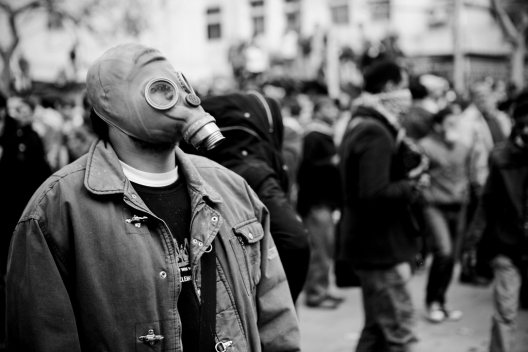 It will soon be the third anniversary of the Egyptian revolution. There will be a flood of articles and opinions about where Egypt stands today, where it might be heading and the significance of various events. Blame will be assigned, pity will be sought, anger will be vented and in proper order events will overtake all views. If the last three years were an epic film, then perhaps a fanciful rewrite is not out of order. Let us then imagine how these years might have unfolded if the revolutionaries had taken a different road.
It will soon be the third anniversary of the Egyptian revolution. There will be a flood of articles and opinions about where Egypt stands today, where it might be heading and the significance of various events. Blame will be assigned, pity will be sought, anger will be vented and in proper order events will overtake all views. If the last three years were an epic film, then perhaps a fanciful rewrite is not out of order. Let us then imagine how these years might have unfolded if the revolutionaries had taken a different road.
If the revolutionaries were a hard-headed bunch, or less romantic, they might have seen the removal of President Hosni Mubarak as small game. They would have set their sights higher on a transformation of Egypt and its narrowing social, intellectual and political horizons. Aside from Mubarak’s resignation, the demands of January 25 were vague. Vague demands elicit empty promises. Let us imagine that the demands were specific and limited. A vote on constitutional amendments within thirty days limiting the presidency to two terms and prohibiting the transition of the office between two people related in the first degree by blood or marriage, a sunset clause on any invocation of emergency laws, and a stipulation that any constitutional amendments are enacted by a vote of at least two-thirds of the participants and that they be no closer than one year apart. These are hardly stirring revolutionary requests, but they are a revolution in disguise, and more importantly, an orderly one. Egypt needs a transformation of society and politics, but not an unruly one.
In all likelihood, the powers in Egypt would have agreed to these demands; indeed many may have breathed a sigh of relief, feeling incorrectly they dodged a bullet. But the events will have overtaken them. By April of 2011 the presidential elections would have been in high gear with five months for all candidates to show their mettle. The sight of the aging man handing power over peacefully after thirty years in office would have deeply affected all Egyptians, and the world beyond. The sitting parliament would have been the rigged body of 2010. The successful presidential candidate’s first move would be to garner popular support by dismissing it and calling for new elections. In the meantime, the parliamentarians would have sensed their weakness and minded their manners. Most importantly the idea of irregular transfers of power between presidents would never have come up and the military would never have been brought into politics in the same degree. The revolutionaries would have worn the mantle of wisdom as well as bravery, giving them an enormous moral power that could be used in tasks such as truth and reconciliation and reform of the police. A slow and deliberate transformation of Egyptian politics would have followed, less revolutionary but less damaging to the social and economic fiber. It is a haunting thought that high youth unemployment in Egypt may have meant that many revolutionaries never held a proper job, met a payroll, made a bed, cleaned a flat or had to think of their responsibilities to those outside their immediate circle.
Many questions come up in such a scenario. Would the Muslim Brotherhood have done as well in the parliamentary elections as they did in 2011? Perhaps, but that still would not have let them have, or more importantly imagine that they could have, a monopoly on Egyptian politics. Would the ugly battles of identity and religion surrounding the 2012 constitution have been avoided or at least made less combustible? In all likelihood yes, as there was no urgency to write an entirely new constitution. Would the army have played a major role in politics and society, including the presence of troops in the street? Probably not, since the role of the army as an arbiter of politics would have been taken off the table early on. Above all, the transformation would have consumed fewer lives and less social capital.
Anger is justified at those who urged revolution with eyes closed, ears plugged and mouths screaming at full volume, and especially at those who paraded to satiate the media’s appetite for reality entertainment. Anger is justified but useless. The task now is to clean up the wreckage after the revolutionary ball. It will not be easy, or pleasant. Revolution, like new love, is a heady business. Governing, like parenting, involves the regular setting of limits, administration of justice, demand for peace and rectification of errors. All are tasks that demand tolerance, compromise and patience; virtues once common in Egypt but now in short supply. It is too late to alter the last three years, but the future can be made brighter by a sober realization that a new system, more liberal and plural, must be built in the shadow of authoritarianism and under constant attack from religious fascism. Nation builders are not those who imagine themselves too pure for politics.
Maged Atiya is an Egyptian-American physicist and businessman. He blogs at http://www.salamamoussa.com and at twitter @salamamoussa
Image: Photo: Hossam el-Hamalawy
